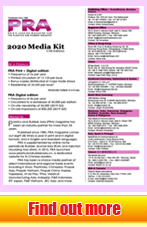Additives: Antimicrobial additives; strength in numbers
Essentially invisible to the naked eye, antimicrobial plastic additives are the best protectors of plastic applications and will be ever so needed after the Covid-19 pandemic lockdowns ease worldwide, as the focus on staying safe becomes vital, says Angelica Buan in this article.
Keeping pathogens at bay with additives
More than the emergence of new pathogenic/ coronavirus strains, the world has a bigger beast to tame, which is the growing resistance of the human body to antibiotics and medications.
According to the World Health Organisation (WHO), rising bacterial infections are increasingly resistant to the medicines that can treat them. The WHO’s Global Antimicrobial Resistance and Use Surveillance System (GLASS) has aggregated data from more than 64,000 surveillance sites with more than 2 million patients enrolled from 66 countries across the world for this study.

WHO says high rates of resistance among antimicrobials frequently used to treat common infections, such as urinary tract infections or some forms of diarrhoea, indicate that the world is running out of effective ways to tackle these diseases. The inappropriate use of antibiotics during the Covid-19 pandemic could also exacerbate resistance, according to WHO.
With consumer awareness increasing on these emerging public health threats, it is no surprise that the market for antimicrobial polymer additives in various applications is growing.
Over the next six years, the market size is likely to reach nearly US$4 billion, at a CAGR of 8% from 2019, according to a report by Acumen Research and Consulting. The growth is hinged on progressive awareness about health-related issues due to the rise in cases of infections, viral outbreaks and other lifethreatening ailments.
Sectors such as healthcare and medical, as well as consumer goods, construction, transportation, and packaging are witnessing brisk demand for antimicrobial plastics owing to their high antimicrobial activity, material strength, durability, and transparency. They are also used in non-toxic plastic equipment, the report said.
Creating a germ-free retail space
A study by the University of Arizona, US, has bared the perils of shopping, that is, the close encounters with disease-causing germs as a result of using shopping carts.
Based on its findings, fresh and raw food items may transfer bacteria such as E-coli or salmonella to carts; not to mention potentially contaminate the handles and cart parts by previous users who may have colds or flu. The latter was precisely why shoppers during the Covid-19 pandemic were told to sanitise their supermarket trolleys.
While thorough sanitisation of carts, especially the handles, is recommended, additional protection from antibacterial plastics can help to further reduce exposure from these pathogens.

Bact-Off, a self-care consumer packaging goods company, in partnership with Smart Plastic Technologies, a company engaged in the development of sustainable polymer additives, have introduced a snap-on plastic handle enabled with Smart Plastic's SPTek Gard antimicrobial additive. Given the current global health concerns, this product provides a solution to support shoppers seeking a clean and healthy in-store shopping experience, the company said.
The SPTek Gard antimicrobial is added during the cart handle’s film production process, making it effective against Methicillin-resistant staphylococcus aureus (MRSA), salmonella, listeria, E-coli, and dozens of other organisms. The cart handle offers an efficacy of up to 99.999% in antimicrobial protection, Bact-Off said.
The additive technology enables bio-assimilation (complete biodegradation of plastic), antimicrobial and antifungal protection, shelf-life extension, odour elimination, gauge reduction, anti-counterfeit tracing and more, says Smart Plastic.
Meanwhile, close-contact areas such as at the point-of-sale (POS) and check-out counters are zones for large concentration of germs.
In the UK, POS and visual merchandising display specialist SDi Displays is providing several retail outlets with bespoke units containing UK additives company Addmaster’s in-built silver-based antimicrobial Biomaster technology. The latter provides an antimicrobial barrier to prevent the growth of harmful bacteria, offering round-the-clock protection and lasting for the entire life cycle of the unit, the company said.
The Biomaster technology can be easily incorporated into any plastic, textile, paper, paint or coating.
SDi has also manufactured 260,000 face guards for use by retail staff, along with more than 10,000 pharmacy and checkout protective screens. The company has also produced 1,500 in-store hand sanitiser stations. These, according to the company, offer hygiene solutions for businesses that are making plans towards reopening upon easing of the lockdowns, and when hygiene will be at the forefront of considerations.
(PRA)
Subscribe to Get the Latest Updates from PRA Please click here
©2020 Plastics and Rubber Asia. All rights reserved.

©2020 Plastics and Rubber Asia. All rights reserved.
Home Terms & Conditions Privacy Policy Webmail Site Map About Us



















